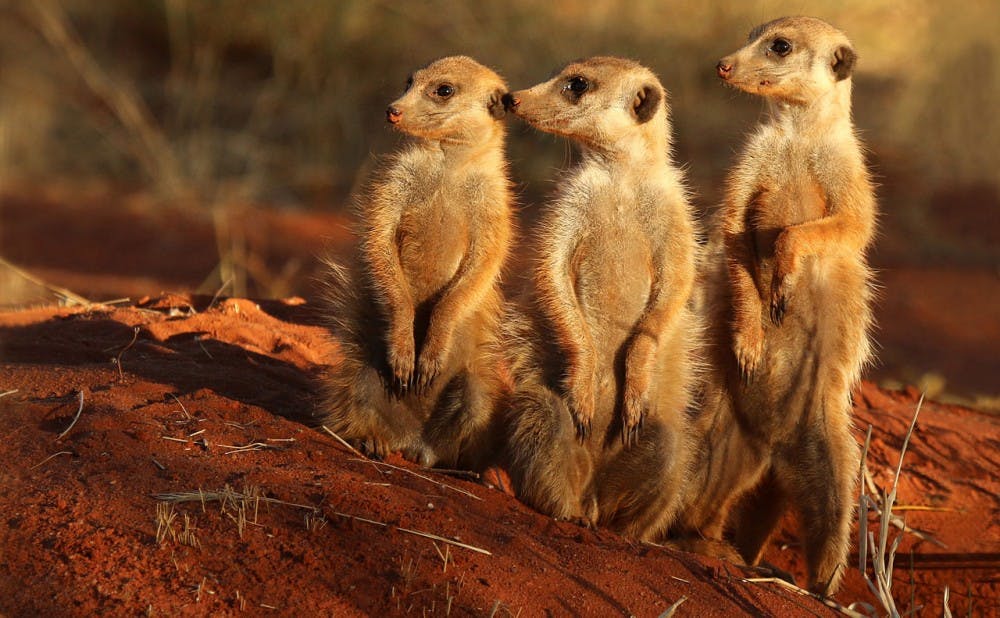A team of Duke researchers and collaborators are examining what the social interactions of meerkats can tell us about human genomics.
Jenny Tung, assistant professor of biology and evolutionary anthropology, and Sayan Mukherjee, professor of statistical science, are part of an international team studying meerkats. The team has recently been awarded a three-year $1.2 million grant from the Human Frontier Science Program to study social mobility in wild meerkats.
Tung explained in an email that the unique social structure of meerkats is valuable for understanding how other mammals cooperate. She added that learning about meerkat social dynamics could help explain the social cooperation of other species, including humans.
“It’s an evolutionarily unusual social system for mammals, but very interesting because it can help us understand the factors that select—in a Darwinian sense—for cooperation,” she wrote. “And of course, we ourselves are also members of a very cooperative species.”
Meerkats live in social groups with only one breeding pair, formed by one dominant male and one dominant female. Other meerkats in the group act as “helpers," Tung wrote, and contribute by babysitting the young or scanning for predators.
When meerkats transition from being subordinate helpers to dominant breeders, they go through a number of physiological changes, Tung noted. She added that transitioning meerkats will often gain weight, exhibit hormonal changes and may even undergo new skeletal growth.
She explained that her team's new award will support research for identifying which genes in the meerkat are active during the transition phase from subordinate to dominant.
“Our grant is aimed at integrating this information with an understanding of what’s going on within cells at the level of gene regulation," Tung wrote. "Because the sequence of the genome doesn’t change over an individual’s lifetime, these major transitions strongly suggest differences in which genes are active or how active they are."
Tung's team will take advantage of an ongoing 20-year-old field project on meerkats in the Kalahari Desert in southern Africa. This project was first initiated by Tim Clutton-Brock, director of research at the University of Cambridge.
Luis Barreiro, the Canadian research chair in the functional and evolutionary genomics of the immune system at McGill University, will also be joining the team.
“This combination gives us the ability to pursue questions and develop new approaches that would be impossible for any subset of us alone," Tung wrote. "I feel very lucky to be working with Sayan, Luis and Tim. Each of them is a real pioneer in their respective fields.”
Their analysis of genetics will also extend into immunology, particularly studying how group involvement in reproduction and growth might affect the immune system. Their hypothesis is that if energy goes into reproduction and growth, meerkats' ability to defend against pathogens becomes weaker.
Barreiro will take an immunological approach in studying the meerkats, while Mukherjee will spearhead the development of new methods for applying x-ray data to develop a 3D model for skeletal growth.
The Human Frontier Science Program—which awarded the grant—has a goal of encouraging scientific collaboration across multiple disciplines and fields, Tung explained. She wrote that the grant will take effect this December, and that the team is excited to get started.
“We all have a lot of experience applying for grants that don’t get funded, and the funding rates for the HFSP grants are low," Tung wrote. "Again, I think a lot of this success depends on having a very strong team. We’re glad that the reviewers were able to understand our vision for the project. Now the real work starts.”
Get The Chronicle straight to your inbox
Signup for our weekly newsletter. Cancel at any time.

